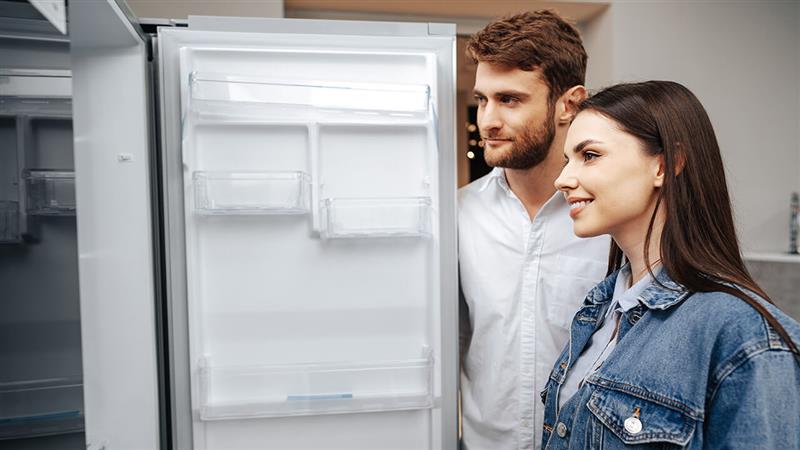Let’s be honest no one likes the surprise of a broken fridge freezer. It’s that one appliance we rely on every day, without giving it much thought… until it stops working. Whether you’re shopping for a new unit or wondering how long your current one has left, it’s a smart move to ask: How long do fridge freezers actually last?
The answer? It depends on a few things: brand, usage, maintenance, and even the environment it’s kept in.
In this blog, we’ll break down:
- The average lifespan of fridge freezers
- Factors that affect longevity
- Signs yours might be on the way out
- Tips to make it last longer
1. Average Lifespan of a Fridge Freezer
Most fridge freezers last between 10 to 15 years. Some high-end models may push past 20 years, while budget models or overworked units might call it quits much sooner.
Here’s a rough breakdown:
| Fridge Freezer Type | Expected Lifespan |
|---|---|
| Standard freestanding model | 10–15 years |
| Built-in / integrated models | 9–13 years |
| American-style fridge freezers | 12–16 years |
| Commercial / heavy-duty units | 10–20 years |
Keep in mind: the lifespan of a fridge freezer isn’t guaranteed — it’s an estimate based on average usage and maintenance.
2. Factors That Affect How Long a Fridge Freezer Lasts
Wondering why some fridges keep going for decades, while others conk out early? Here are a few key factors:
Brand and Build Quality
Like with most appliances, better quality materials and construction usually mean a longer life. Trusted brands like Bosch, Samsung, LG, and Miele often outlast cheaper alternatives.
Usage Frequency
A fridge in a busy family home that’s constantly opened and closed may wear out faster than one in a single-person flat. Constant temperature fluctuations put extra pressure on the compressor.
Maintenance Habits
Regular cleaning, defrosting, and checking door seals go a long way. Ignoring basic upkeep can shave years off your fridge freezer’s lifespan.
Room Temperature
Fridges work harder in hot environments. If yours is in a warm kitchen or near a cooker, it might not last as long as one in a cooler setting.
Power Surges
Frequent electrical surges can damage internal parts, especially the compressor. Using a surge protector helps protect your appliance.
3. Signs Your Fridge Freezer Is Nearing the End
Not sure whether your appliance is just acting up or really ready to retire? Here are some clear signs your fridge freezer could be wearing out:
- It’s Not Cooling Properly: If your milk keeps going bad or your ice cream is soft, the internal cooling system may be failing.
- It’s Noisy Really Noisy: A healthy fridge hums quietly. Clicking, buzzing, or rattling sounds can signal motor or fan issues.
- The Back Feels Hot: While some warmth is normal, excessive heat at the back of your fridge is a red flag.
- Frost Buildup Is Out of Control: Too much frost in the freezer can mean a failing thermostat or poor sealing.
- It’s Over 10 Years Old: Even if it’s still working, an older fridge freezer may be less energy efficient and prone to sudden breakdowns.
4. How to Extend the Life of Your Fridge Freezer
No one wants to replace appliances every few years. Here are a few simple tips to extend your fridge freezer’s life:
Clean the Coils
Dust and dirt buildup on condenser coils can cause your unit to overheat. Clean them every 6–12 months using a vacuum or soft brush.
Don’t Leave the Door Open
Sounds obvious, but it’s worth repeating. Leaving the door open too long makes the motor work harder to cool things down again.
Don’t Overstuff It
An over packed fridge or freezer blocks air circulation. Keep it about 70–80% full for optimal airflow.
Defrost Regularly (if Manual)
Manual defrost models need to be cleared of ice build-up. Don’t let frost accumulate, or it will force your compressor to work harder.
Avoid Overloading the Power Supply
If your fridge freezer shares an outlet with other large appliances, it could cause voltage drops. Give it a dedicated outlet if possible.
Get It Serviced
Getting your fridge checked once a year can spot small problems before they turn big.
Also, read more about the Energy Efficient Budget Fridge Freezers for Small Spaces
5. When Should You Replace a Fridge Freezer Instead of Repairing It?
This is a common question. As a rule, if fixing it costs over half the price of a new one, it’s smarter to replace it.
You might also want to upgrade if:
- Your fridge is over 10 years old and doesn’t run efficiently anymore
- It doesn’t meet your space or storage needs anymore
- Your energy bills are higher than normal
- The unit requires frequent fixes
Newer fridge freezers are more energy-efficient and feature-rich, think smart controls, frost-free tech, and better layout designs.
6. Should You Buy a New or Refurbished Fridge Freezer?
If budget is a concern, refurbished fridge freezers can be a great value just make sure you’re buying from a reputable supplier. Most are fully tested and include a warranty before being resold.
Buying new, on the other hand, gives you the latest tech, full warranty, and peace of mind.
7. Energy Efficiency and Your Fridge Freezer’s Lifespan
Did you know older fridge freezers use up to twice the energy of newer models? Replacing a 15-year-old unit with an A-rated model could save you £60–£100 a year in electricity.
Energy-efficient models usually last longer and have fewer problems.
Conclusion: Plan Ahead for Peace of Mind
So, how long should a fridge freezer last? While 10 to 15 years is the average, the way you use and care for your appliance plays a major role.
Keep an eye out for signs of wear, perform regular maintenance, and know when it’s time to say goodbye. With a little TLC, your fridge freezer can serve you well for over a decade.


